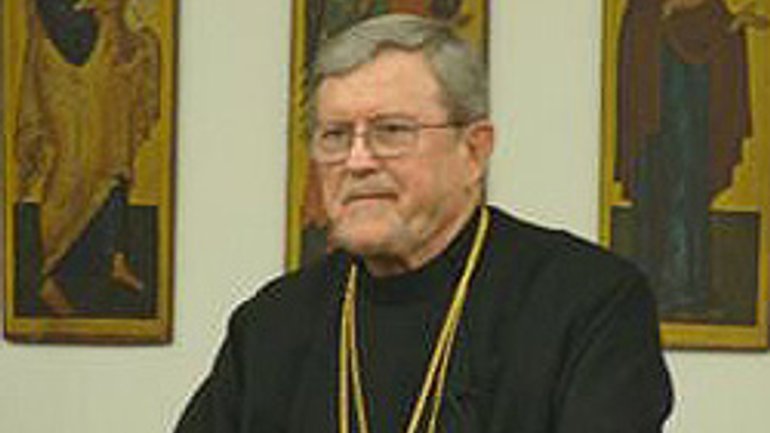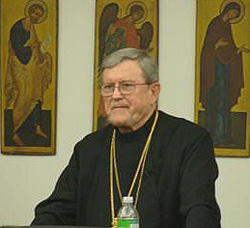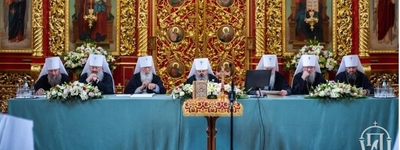Archimandrite Robert F. Taft, SJ: critic and defender of the christian east

 If Christianity is to survive as a viable lifestyle attractive to modern men and women, it will not be as an obscurantist, anti-intellectual culture of folklore and ritualism, sustained by the rejection of modernity and change…. – Archimandrite Robert F. Taft, SJ
If Christianity is to survive as a viable lifestyle attractive to modern men and women, it will not be as an obscurantist, anti-intellectual culture of folklore and ritualism, sustained by the rejection of modernity and change…. – Archimandrite Robert F. Taft, SJ
In today’s West it is acceptable, even fashionable, to be a friend of Ukraine. But it was not always so. Throughout the twentieth century, few Western intellectuals dared to befriend a nation whose very existence many denied. Those who did were people of strong character and firm convictions, willing to swim against the current.
This was also the case in the area of religion, where from the 1960s, Vatican Ostpolitik focused on the Russian Orthodox Church and tended to ignore Ukrainian Greek-Catholics. One of the staunchest friends of the Ukrainian Church was Archimandrite Robert F. Taft, SJ, who passed into eternity on 2 November. He was indeed a man of remarkable character as well as enormous learning.
Robert Francis Taft was born in 1932 in Providence, Rhode Island, to an elite American family that included William Howard Taft, President of the United States from 1909 to 1913 and Chief Justice of the U.S. Supreme Court in the 1920s. Robert F. Taft entered the Jesuit novitiate in 1949 and studied Russian at Fordham University in New York. Ordained in the Byzantine rite in 1963, he completed a doctorate at the Pontifical Institute of Oriental Studies in Rome in 1975. His doctoral thesis on the Great Entrance in the Byzantine divine liturgy was published to critical acclaim.
As professor of liturgics at the Oriental Institute from 1975 to 2011, he also taught regularly at Notre Dame University in the U.S. In Rome, Fr. Taft supervised dissertations, edited journals, and published scholarly works on the Eastern Churches. He was raised to the rank of archimandrite in the Ukrainian Greek-Catholic Church in 1998. In 2001, he was elected a corresponding fellow of the British Academy.
Among Archimandrite Taft’s publications was a comparative study of the Liturgy of the Hours in East and West (1986), a History of the Byzantine Rite (1999), and a six-volume study of the Liturgy of St. John Chrysostom (1978-2008). He also published several articles in Logos: A Journal of Eastern Christian Studies, the journal of the Metropolitan Andrey Sheptytsky Institute of Eastern Christian Studies, now located in Toronto. Among them are “The Contribution of Eastern Liturgy to the Understanding of Christian Worship” (Logos vol. 37 (1996) no. 1-4: 273-98) and the provocatively titled “Eastern Catholic Theology – Is There Any Such Thing? Reflections of a Practitioner” (Logos vol. 39 (1998) no. 1:13-58). “Translating Liturgically” (Logos vol. 39 (1997) no. 2-4: 155-90) should be required reading for anyone engaged in the subtle and complex art of liturgical translation.
To a church community only vaguely acquainted with the Christian East, Taft stressed that the East is not only Orthodoxy, but also Eastern Catholicism, and that the Eastern Catholic Churches are not only Byzantine, but also Coptic, East and West Syrian, and Armenian. While he loved and defended the East, he also believed that the East could learn from the West:
…the East also needs the more typically “Western” virtues of flexibility, the ability to cope with change as a law of our modern culture, objectivity, openness, fairness, self-criticism, and a sense of the unity of modern global culture in which no one is or can remain an island. If Christianity is to survive as a viable lifestyle attractive to modern men and women, it will not be as an obscurantist, anti-intellectual culture of folklore and ritualism, sustained by the rejection of modernity and change…. (“The Contribution of Eastern Liturgy to the Understanding of Christian Worship,” Logos vol. 37 (1996) no. 1-4: 297.)
In matters of church governance, Taft favored the Eastern tradition of synodality. A blunt critic of both East and West, he punctured the romantic delusions of the half-educated. While some of his less erudite fellow-Jesuits adulated the Patriarchate of Moscow, Taft had no such illusions.
He also had hope for the future of Eastern Christianity:
…it would be wrong to think that Eastern Christianity does not have within itself the spiritual means to cope with modernity. As we have seen, Eastern liturgy – and liturgy is simply the mirror to Orthodoxy’s inner world -- has preserved from the storehouse of its past, elements that are not only desperately needed but also of great appeal to modern men and women… (Id., 296)
As a voice of hope as well as an exemplar of dedicated work and honest scholarship, Archimandrite Robert F. Taft, SJ should long be remembered by all Eastern Christians.










